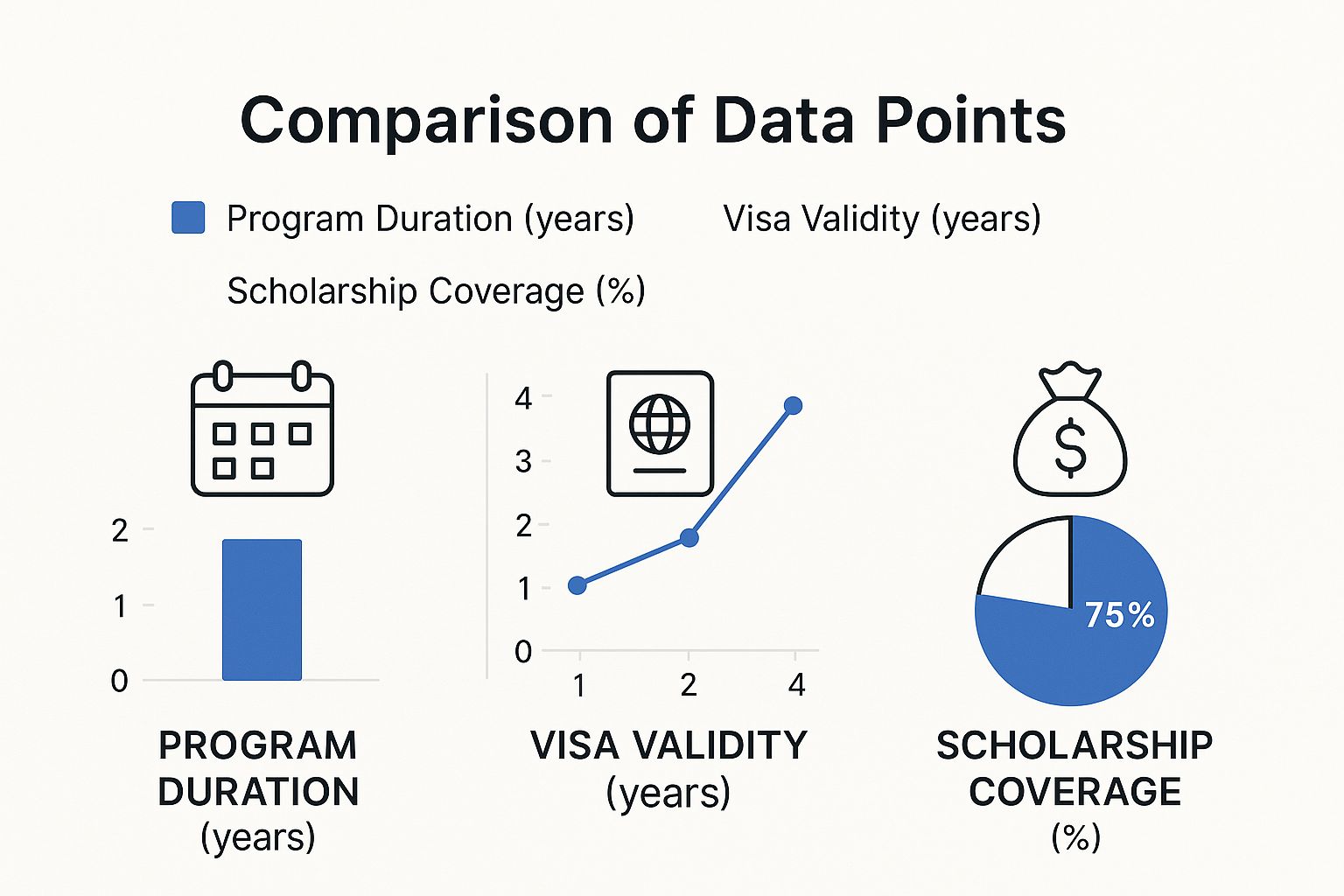Letter of Intent for Visa Application: Expert Guide

The Power of Your Letter of Intent in Visa Decisions

For Nigerians looking to relocate to Germany in 2025, the letter of intent is a vital part of the visa application process, regardless of whether you plan to work or study. It’s your opportunity to present yourself positively and clearly express your reasons for wanting to live in Germany. This letter serves as a personal statement, connecting your application paperwork with your individual goals and aspirations. It’s where you explain why Germany is your chosen destination and what you intend to accomplish there.
This document directly addresses potential questions visa officers may have. It clarifies your purpose for travel, highlighting details such as your chosen study program, whether it’s a sought-after Ausbildung, a Master’s degree through a DAAD scholarship, or a secured employment contract under the Skilled Worker Visa. Providing these specifics demonstrates your commitment and reduces concerns about potential overstays. A well-written letter of intent also shows respect for the application process, which can positively influence the outcome.
This is especially important considering the current rise in global travel, which naturally impacts visa processing timelines. The international travel industry is experiencing a significant resurgence, with projections of 850-900 million international arrivals by the close of 2022. Learn more about global travel trends
Why Your Letter of Intent Matters
A letter of intent is more than just a required document; it’s a critical component of visa decisions. It adds context and a personal dimension to your application. For instance, if you are applying for a Job Seeker Visa (Opportunity Card) to explore employment prospects, your letter should emphasize your professional experience and identify the specific industries you are targeting within Germany. This shows you have a focused plan and strengthens your application. Conversely, a generic, uninspired letter can have a negative impact.
Distinguishing Between Key Documents
Many applicants confuse the letter of intent with other application materials, which can weaken their overall submission. Unlike a cover letter for a job application, the letter of intent focuses on your reasons for wanting to enter Germany. It’s also distinct from an invitation letter, which is issued by a German host and fulfills a different requirement. Understanding these differences is essential for creating a cohesive and convincing application package. Submitting a well-organized and persuasive letter of intent showcases your commitment, significantly boosting your chances of securing your German visa.
Building Blocks of a Visa-Winning Letter of Intent

A strong letter of intent is crucial for a successful German visa application. It’s your opportunity to present a compelling narrative, showcasing your commitment and preparation for your time in Germany. This is especially important for Nigerians exploring opportunities, whether through academic programs like Bachelor’s, Master’s, or PhD studies, vocational training (Ausbildung), or work visas such as the Skilled Worker Visa, EU Blue Card, or Job Seeker Visa (Opportunity Card). This section details the key components of an effective letter.
Clear and Concise Formatting
First impressions are essential. A well-formatted letter demonstrates attention to detail and respect for the application process. Use a professional font, clear headings, and a logical structure. Think of it as dressing professionally for an important meeting – you want to convey competence and seriousness. This includes proper addressing, accurate dates, and a concise subject line stating your purpose, for example, “Letter of Intent for a German Student Visa.”
A strong letter of intent is a key factor in obtaining a German visa. Think of it as your personal introduction to the visa officer, providing context and highlighting your strengths. It’s your chance to address any potential concerns upfront, reinforcing the merits of your application.
Before submitting your visa application, it’s beneficial to review a comprehensive guide on crafting a compelling letter of intent. This will help you avoid common mistakes and ensure your letter effectively supports your application. For a deeper dive into this topic, you can explore this helpful resource: How to master a winning letter of intent for a German visa.
Articulating Your Purpose
Clearly stating your reason for traveling to Germany is paramount. Whether pursuing a specific Master’s program or contributing your skills through the Skilled Worker Visa, articulate your objectives with conviction. Explain your reasons for choosing Germany, perhaps highlighting the reputation of German universities or the opportunities within your chosen field. This demonstrates your understanding of the German context and reinforces your genuine interest.
Addressing Germany’s language requirements directly also shows your commitment to integration. Mention your current German proficiency level and your plans for improvement, perhaps through enrollment at a Goethe-Institut in Nigeria.
Demonstrating Home Ties
Visa officers carefully consider an applicant’s intention to return to their home country. Highlighting strong ties to Nigeria is therefore critical. Emphasize family connections, property ownership, or ongoing professional commitments to reassure officials that you have compelling reasons to return after your stay in Germany. This connects back to the importance of a defined plan, whether completing your studies or fulfilling a work contract. A clear timeline further strengthens your commitment to returning home.
Proving Financial Stability
Demonstrating financial stability is non-negotiable. You must prove you can support yourself without relying on public funds. Provide clear evidence of funds, such as a blocked account, a common requirement for German visas. A blocked account verifies you possess the necessary resources to cover your living expenses in alignment with Germany’s cost of living. Simply stating you have the funds isn’t enough; connect your financial preparedness to your German plans. For example, explain how your blocked account will cover tuition and living expenses throughout your program. This demonstrates thoughtful planning and provides essential context.
To understand more about blocked accounts and financial requirements for German visas, consult resources like the official website of the German Missions in Nigeria or the Federal Foreign Office.
Cultural Sensitivity
Cultural awareness enhances your application. Researching German customs and social norms demonstrates respect and a willingness to integrate. While extensive knowledge isn’t required, showing awareness of basic cultural etiquette strengthens your application and signals your adaptability. This cultural sensitivity can leave a positive impression, contributing to a successful visa outcome. Remember, each element of your application contributes to the overall narrative. Craft yours carefully and purposefully to improve your chances of a positive outcome.
This table outlines the key elements that should be included in every letter of intent for visa applications, explaining the purpose of each component and providing examples.
| Component | Purpose | Example |
|---|---|---|
| Clear Purpose Statement | Explains the reason for your intended stay in Germany | “I am writing to express my strong interest in pursuing a Master’s degree in Computer Science at the Technical University of Munich.” |
| Academic/Professional Background | Highlights your qualifications and experience relevant to your purpose of visit | “My Bachelor’s degree in Electrical Engineering from the University of Lagos, coupled with my internship experience at Siemens Nigeria, has prepared me well for this program.” |
| Reasons for Choosing Germany | Explains your specific interest in Germany and the chosen institution/company | “Germany’s renowned engineering programs, particularly TUM’s focus on practical application, align perfectly with my career goals.” |
| Financial Stability Proof | Demonstrates your ability to support yourself financially during your stay | “I have secured a blocked account with Deutsche Bank, ensuring sufficient funds for my tuition and living expenses.” |
| Home Ties | Provides evidence of your intention to return to your home country after your stay | “My family resides in Lagos, where I also maintain significant professional connections that I plan to resume upon completing my studies.” |
| Future Plans | Outlines your plans after completing your intended purpose in Germany | “Upon graduating, I plan to return to Nigeria and contribute my enhanced skills to the growing tech sector.” |
This table summarizes the core components of a strong letter of intent, emphasizing the importance of addressing each point clearly and concisely. By following these guidelines, you can significantly improve the effectiveness of your letter and enhance your chances of visa approval.
Crafting Your Letter: From First Draft to Final Approval

Writing a compelling letter of intent for your German visa application is essential for achieving your relocation goals. It’s more than just ticking boxes; it’s about crafting a clear, concise, and persuasive narrative that resonates with the visa officer. This section guides you through creating a letter that strengthens your application, whether for a Skilled Worker Visa, EU Blue Card, Job Seeker Visa (Opportunity Card), or academic pursuits like Bachelor’s, Master’s, PhDs, or vocational training (Ausbildung).
Researching Country-Specific Requirements
Begin by thoroughly researching the specific requirements for your visa category. The German Missions in Nigeria and the Federal Foreign Office website offer detailed information. Understanding these nuances is crucial for tailoring your letter effectively. For instance, student visa requirements might differ significantly from those for a work visa.
Remember, applicants often need to provide various documents, including a police certificate from any country where they’ve lived for one year or more. This underscores the importance of thorough background checks. For more detailed information on visa application requirements, explore this topic further.
Structuring Your Letter for Clarity
Organize your letter logically. Start with a clear introduction stating your purpose and chosen visa category. Then, detail your academic or professional background, highlighting experiences relevant to your German plans. For example, if applying for a Master’s program, emphasize your relevant Bachelor’s degree and any internships. This structured approach allows visa officers to quickly grasp your qualifications and intentions.
Using a Persuasive Tone
Adopt a formal yet personable tone. Avoid overly casual language, but inject enough personality to make your letter engaging. Express genuine enthusiasm for your chosen path in Germany, whether contributing to a specific industry or pursuing a particular academic program. This authenticity strengthens your narrative and demonstrates your commitment.
Addressing Potential Concerns Proactively
Anticipate potential concerns a visa officer might have. If there are gaps in your documentation or unusual circumstances regarding your travel history, address them transparently. Frame these explanations positively, highlighting your proactive approach to resolving any potential issues. This demonstrates preparedness and honesty.
Reviewing and Refining Your Letter
Before submitting, review your letter from the visa officer’s perspective. Ensure every sentence contributes to your overall narrative. Seek feedback from others who have successfully navigated the German visa process. Their insights can offer valuable perspective. This meticulous review can significantly improve your letter’s impact. A well-crafted letter of intent can be the deciding factor in your German visa application.
Tailoring Your Letter for Different Visa Types: Strategic Approaches

The infographic above illustrates the connection between program duration, visa validity, and potential scholarship opportunities for various study programs in Germany. Longer programs, such as PhDs, often come with extended visa validity and a higher chance of scholarship funding. This underscores the need to tailor your letter of intent to the specific visa category you are applying for.
A generic letter of intent simply won’t suffice for a German visa application. Each visa category has its own set of requirements. For instance, a tourist visa requires a clear demonstration of your intent to return to your home country after your trip. You might achieve this by highlighting family ties, property ownership, or ongoing employment commitments.
However, these elements are less critical for a student visa, which prioritizes your academic plans and financial stability in Germany.
Understanding Visa Officer Concerns
Visa officers assess applications based on specific concerns related to each visa type. For tourist visas, the main concern is the risk of overstaying. Your letter should address this directly by showcasing strong ties to your home country and a definite return plan. For work visas, such as the Skilled Worker Visa or EU Blue Card, the emphasis shifts to your professional qualifications and the legitimacy of your job offer.
Your letter should showcase your skills and experience, explicitly linking them to the job requirements. If you are applying for a Job Seeker Visa (Opportunity Card), your letter should detail your job search strategy and target industries within Germany.
Strategic Frameworks for Different Visas
Successfully addressing these concerns requires a targeted approach. For a student visa, highlighting your academic accomplishments, acceptance into a recognized German university, and proof of financial resources (such as a blocked account) is paramount. Mentioning the duration of your program—Bachelor’s, Master’s, PhD, or Ausbildung—demonstrates a clear understanding of your commitment.
For business visas, the focus should be on the purpose and duration of your trip, along with confirmation of your company’s support. This provides reassurance to visa officers that your intentions align with the visa category. For a broader understanding of visa categories and their specific requirements, consider exploring our guide on different UK visa types. This offers valuable insight into the underlying principles of visa applications.
To help illustrate these points, let’s take a look at the following comparison table:
Visa Type Comparison: Key Letter of Intent Focus Areas
| Visa Type | Primary Focus | Secondary Focus | Common Pitfalls |
|---|---|---|---|
| Tourist Visa | Clear intention to return home | Itinerary details and travel purpose | Not emphasizing ties to home country |
| Student Visa | Academic qualifications and financial stability | Program details and university acceptance | Lack of clarity on funding and post-graduation plans |
| Work Visa (Skilled Worker/EU Blue Card) | Professional skills and experience matching job offer | Legitimacy of employment contract | Not connecting skills directly to job requirements |
| Job Seeker Visa (Opportunity Card) | Job search strategy and target industries | Qualifications and relevant experience | Vague or unrealistic job search plans |
| Business Visa | Purpose and duration of business trip | Company support and financial backing | Not clearly stating the nature of the business activity |
This table summarizes the key focus areas for each visa type, helping you avoid common pitfalls and strengthen your application.
Examples of Tailored Approaches
Consider these examples: for a student visa, you might write, “I am excited to begin my Master’s program in Engineering at RWTH Aachen University. My blocked account ensures I have sufficient funds for my two-year program, and I plan to return to my home country upon graduation to utilize my newly acquired skills.” This statement addresses both financial stability and return intentions.
For a business visa, you might write, “My trip to Germany is for a week-long conference related to my work at XYZ Company. All expenses are covered by my employer, and I have a confirmed return flight booked for [date].” This clearly demonstrates the temporary and specific nature of your visit. After writing your letter, effective editing is essential. This resource provides useful advice on how to edit your own writing.
Even regions like Southeast Asia are adapting their visa strategies. Thailand has proposed a Schengen-style visa to boost regional tourism, potentially impacting 70 million tourists and generating approximately $48 billion in revenue. Learn more about these developments. By understanding the nuances of each visa category and adapting your letter of intent accordingly, you significantly improve your prospects of a successful application. A well-crafted letter showcases your commitment and assures visa officers that your intentions align with the specific visa requirements.
Red Flags and Roadblocks: Mistakes That Sink Applications
Securing a German visa, whether for work or studies, can be a complex process. Even seemingly small errors in your application, particularly your letter of intent, can derail your plans to relocate to Germany from Nigeria. This section explores common mistakes that often trigger concerns for immigration officers, drawing on insights from rejected applications and experienced visa consultants.
Inconsistencies: A Major Credibility Issue
One of the quickest ways to raise a red flag is to have inconsistencies between your letter of intent and your supporting documents. For example, applying for a Skilled Worker Visa while simultaneously mentioning tourism as your primary goal in your letter creates an immediate contradiction. This type of discrepancy undermines your credibility and raises doubts about your true intentions. Ensure your narrative remains consistent across all submitted materials to reinforce your commitment to the specific visa category.
Vague Travel Plans: Inviting Scrutiny
Unclear or poorly defined travel plans can also be detrimental to your application. If you’re applying for a Job Seeker Visa (Opportunity Card), outlining specific industry targets demonstrates a focused job search strategy, which strengthens your application. Conversely, a generic statement like “exploring various opportunities” can trigger suspicion about your real purpose for entering Germany. Be specific about the industries you’re targeting and explain your reasoning.
Problematic Language: Signaling Potential Overstay
Certain phrases, while seemingly harmless, can inadvertently signal a risk of overstaying. Expressing excessive enthusiasm for permanently settling in Germany, even when applying for a temporary visa like a student visa, can raise concerns about your intention to return to Nigeria. Focus your language on the specific activities permitted under your chosen visa category, whether it’s pursuing a Bachelor’s, Master’s, or PhD program, undertaking vocational training (Ausbildung), or working under a Skilled Worker Visa or EU Blue Card.
Cultural Misunderstandings: Adapting to German Norms
Applying Nigerian cultural norms to a document reviewed by German officials can lead to misinterpretations. The level of formality expected in Nigerian communication may not be appropriate in a German context. Researching German communication styles and tailoring your letter accordingly demonstrates cultural sensitivity and improves your credibility. For further guidance, consider this helpful resource: How to master a strong letter of intent and avoid misrepresentation.
Before-and-After Examples: The Power of Precise Wording
Here’s a practical example of how a simple change in wording can significantly impact the perception of your intent:
- Before: “I’m eager to experience German life and possibly settle there long-term.” (Raises concerns about overstaying)
- After: “I’m eager to commence my Master’s program at [University Name] and contribute my skills upon returning to Nigeria after graduation.” (Reinforces return intention)
This subtle shift clarifies your commitment to returning home after completing your studies. For certain visa types, understanding International Background Checks is crucial, and researching this aspect can be beneficial. By avoiding these common pitfalls and crafting a meticulous letter of intent, you significantly improve your chances of securing your German visa. Remember, clarity, consistency, and a nuanced understanding of the application process are key.
Real-World Templates That Actually Work
Moving beyond theory, let’s explore practical, proven templates for your German visa application letter of intent. These examples, adapted from successful applications, address common scenarios Nigerians face when relocating to Germany. Adaptability is key. These templates offer a solid foundation; personalize them with your unique circumstances and objectives.
Template 1: Student Visa (Master’s Program)
[Your Name]
[Your Address]
[Your Phone Number]
[Your Email Address]
[Date]
German Embassy
[Embassy Address]
Subject: Letter of Intent for a German Student Visa – Master’s Program in [Your Field of Study]
Dear Visa Officer,
I am writing to express my strong interest in a student visa to pursue a Master’s degree in [Your Field of Study] at [University Name] in Germany, starting in [Month, Year].
My Bachelor’s degree in [Your Previous Field of Study] from [University Name, Nigeria] provides a strong base for this next academic step. My academic transcript, included with this application, showcases my consistent academic achievements. I selected [University Name] for its renowned faculty and emphasis on [Specific Area of Research or Study], aligning perfectly with my career goals.
I have secured funding through a blocked account with [Bank Name], covering my tuition and living expenses for the two-year program. A copy of the blocked account confirmation is enclosed.
After graduation, I plan to return to Nigeria and apply my enhanced skills and knowledge to the [Your Intended Field of Work/Industry]. My family lives in [City, Nigeria], reinforcing my commitment to returning home after my studies.
Thank you for your time and consideration. I anticipate the opportunity to study in Germany.
Sincerely,
[Your Name]
Template 2: Skilled Worker Visa
[Your Name]
[Your Address]
[Your Phone Number]
[Your Email Address]
[Date]
German Embassy
[Embassy Address]
Subject: Letter of Intent for a German Skilled Worker Visa
Dear Visa Officer,
This letter supports my Skilled Worker Visa application to begin working at [Company Name] in [City, Germany] as a [Your Job Title], starting on [Date].
My [Number] years of experience as a [Your Previous Job Title] at [Previous Company Name, Nigeria] has provided me with the necessary skills for this role, detailed in my CV. I have included my employment contract with [Company Name], outlining my duties and salary, confirming this opportunity. My qualifications, including [Mention specific degrees, certifications, or training], directly match the position’s requirements.
I am prepared for the cultural shift to Germany and am currently studying German at [Name of Language School/Institute] in [City, Nigeria]. I am committed to integrating into German society and contributing to the [Industry/Field] sector.
I understand the importance of visa regulations and will respect its terms. After my contract, I intend to return to Nigeria, where I have strong family ties and professional networks.
Thank you for considering my application.
Sincerely,
[Your Name]
Template 3: Job Seeker Visa (Opportunity Card)
[Your Name]
[Your Address]
[Your Phone Number]
[Your Email Address]
[Date]
German Embassy
[Embassy Address]
Subject: Letter of Intent for a German Job Seeker Visa (Opportunity Card)
Dear Visa Officer,
I am writing to express my interest in a Job Seeker Visa (Opportunity Card) to explore employment opportunities in Germany. I am a skilled [Your Profession] with [Number] years of experience in the [Your Industry] sector.
My main goal in Germany is to secure a position in the [Specific Industry/Field, e.g., IT, Engineering, Healthcare]. My qualifications, including [Mention relevant degrees, certifications], and experience make me a suitable candidate for roles in this area. I have started researching potential employers in Germany, focusing on companies like [Mention specific companies, if applicable], and will network extensively within the [Target Industry/Field] upon arrival.
My blocked account with [Bank Name] demonstrates my financial independence during my job search.
I am prepared for life in Germany and am actively learning German to aid my integration. After securing a position, I will apply for the appropriate work visa.
Thank you for your consideration.
Sincerely,
[Your Name]
These templates show how a structured letter of intent strengthens your visa application. Remember to adapt them to your specific situation and visa category. For personalized guidance on your relocation, explore JapaChat – Nigeria’s AI-powered immigration expert. Start planning your move with JapaChat today!

Leave a Reply